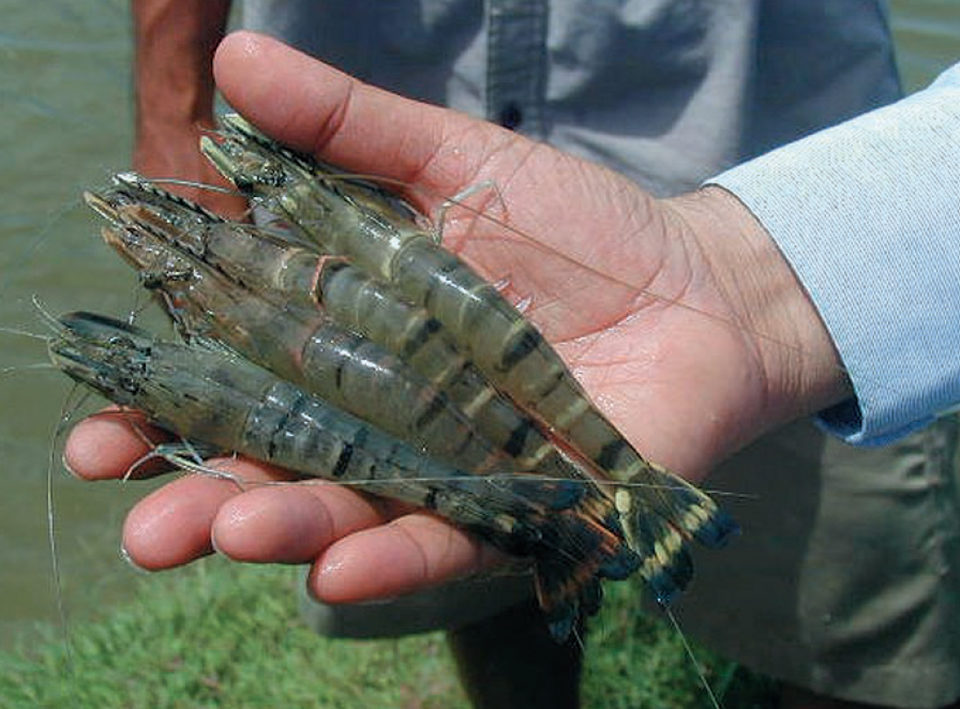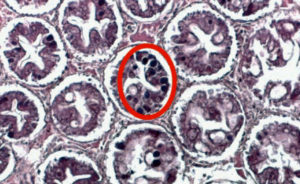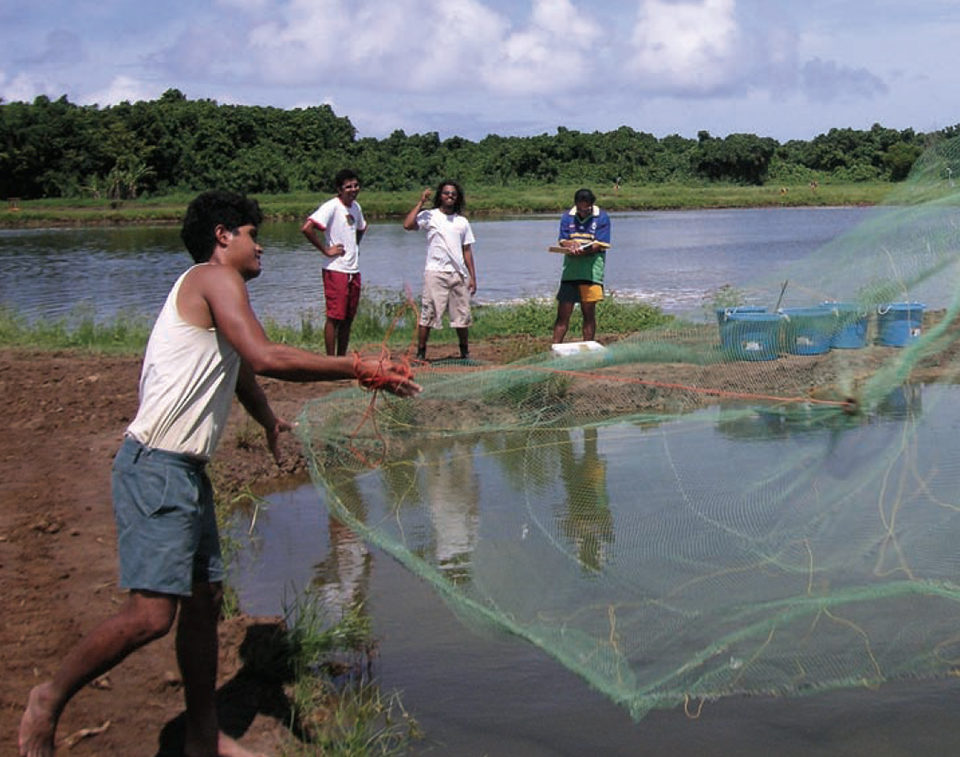Shrimp from five sites screened for eight major viruses

Fiji has a large and growing demand for shrimp. Shrimp farming in Fiji began over 20 years ago and has had a history of ups and downs. Presently, the industry consists of one hatchery and five farms, only two of which are currently operational. The species produced is the western blue shrimp (Litopenaeus stylirostris).
Black tiger shrimp (Penaeus monodon) are considered to have excellent culture potential in Fiji because of their fast growth, large size at maturity and high meat yield and quality. Their natural presence in Fiji waters provided the incentive for a study by the University of the South Pacific to determine if any shrimp viruses were present in local black tiger populations.
The study was funded by the Australian Centre for International Agricultural Research as part of a project on sustainable aquaculture development in the Pacific region. It was carried out with the support of the School of Marine Studies and Institute of Marine Resources at the University of the South Pacific.
Testing for viruses

In 2004, wild P. monodon samples were sent from Fiji to the Commonwealth Scientific and Industrial Research Organisation laboratory in Brisbane, Australia, for analysis. Shrimp from five Fiji sites were screened for the presence of eight major viruses using polymerase chain reaction (PCR) and histology testing. Shrimp viral DNA was also sequenced to determine the presence of any unique viral strains
PCR tests showed that Hepatopancreatic Parvolike Virus (HPV), Monodon Baculovirus (MBV), Infectious Hypodermal and Hematopoietic Necrosis Virus, Mourilyan Virus (MoV) and Gill-Associated Virus (GAV) were present in all samples, although MBV was absent at one site. Histology results supported the findings. However, several major viruses – including White Spot Syndrome Virus (WSSV), Taura Syndrome Virus (TSV), and Yellow Head Virus (YHV) – were not detected in any samples. These are the more lethal viruses responsible for major disease outbreaks and mortalities in many areas that practice shrimp culture.
DNA sequences of Fiji GAV and MoV were only 1 to 2 percent different from the Australian strains, implying that these viruses may have originated from Australia, possibly in a past importation of infected postlarvae for a local farm. However, as there were no tests done prior to this importation, other explanations include the possibility of the viruses’ natural presence in wild Fiji P. monodon.
HPV from Fiji showed a significant 20 percent difference from the Australian HPV strain, while the MBV was 5 percent different from an Indian strain. This suggested they may have been naturally present in Fiji shrimp and not introduced, or acquired from another local shrimp species.
Positive news
Although Fiji’s black tiger shrimp stocks have some penaeid shrimp viruses, not all are present in the country and that is certainly good news. Furthermore, none have manifested clinically as a shrimp disease in Fiji. This is most likely because there has not been an environment that would favor the development of a disease, like very high stocking densities. Experience elsewhere indicates it is possible to successfully farm shrimp in the presence of various viruses, avoiding disease outbreaks through the implementation of sustainable, optimum hatchery and pond conditions and management.
Fiji’s fledgling shrimp industry is now in a position to make decisions concerning shrimp viral diseases before disease can become a problem. At a recent workshop for shrimp stakeholders, the Fiji Quarantine Services were made aware of the importance of protecting local P. monodon stocks from the introduction of major shrimp viruses, such as WSSV and YHV.

Continued monitoring
Recommendations were made to continue PCR tests to monitor the viral status of Fiji’s P. monodon shrimp stocks, and to test live shrimp imports to avoid the introduction of new viruses. There are also plans to control the potential importation of infected frozen shrimp and to draft and implement a biosecurity plan for shrimp imports.
Already, Fiji has increased its biosecurity measures with respect to imported shrimp broodstock and postlarvae by testing live imports of shrimp. Other Pacific Island countries have also shown an interest now that the University of the South Pacific has the capacity to carry out shrimp virus testing.
(Editor’s Note: This article was originally published in the May/June 2007 print edition of the Global Aquaculture Advocate.)
Now that you've finished reading the article ...
… we hope you’ll consider supporting our mission to document the evolution of the global aquaculture industry and share our vast network of contributors’ expansive knowledge every week.
By becoming a Global Seafood Alliance member, you’re ensuring that all of the pre-competitive work we do through member benefits, resources and events can continue. Individual membership costs just $50 a year. GSA individual and corporate members receive complimentary access to a series of GOAL virtual events beginning in April. Join now.
Not a GSA member? Join us.
Author
-
Salote Waqairatu
School of Marine Studies
Faculty of Islands and Oceans
University of the South Pacific
P. O. Box 1168
Suva, Fiji[107,117,46,111,99,46,111,111,104,97,121,64,119,95,105,110,105,101,115]
Tagged With
Related Posts

Health & Welfare
Black tiger breeding program yields record shrimp harvests in Australia
Traditionally, Australian farmers relied on wild broodstock to source black tiger shrimp larvae, but substantial progress has been made in the domestication and selective breeding of Australian P. monodon.

Health & Welfare
Black tiger domestication, selective breeding advance in Australia
Using clear-water tank systems, CSIRO and a collaborating farm have advanced the domestication of black tiger stocks in Australia.

Health & Welfare
Black tiger shrimp domestication advances
The production of early generations of domesticated broodstock in open-environment ponds may have hampered the domestication of black tiger shrimp.

Health & Welfare
Brunei project develops technology for large black tiger shrimp production, part 1
A five-year project was undertaken in Brunei Darussalam to develop advanced technology for the production of large black tiger shrimp. A combination of technologies has enabled efficient production of large-sized black tiger shrimp, which could lead to a resurgence of this species in Asia.


